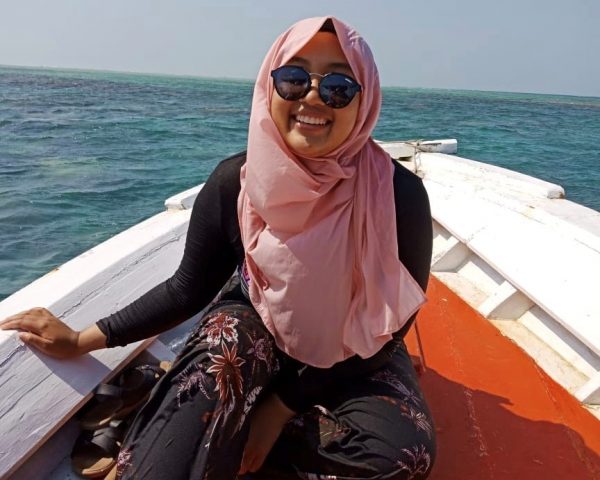Studying abroad: Ardiana in Indonesia
Gepubliceerd: 27 September 2018 • Leestijd: 2 minuten en 37 seconden • English Dit artikel is meer dan een jaar oud.Ardiana Prima, fourth-year student of Trade Management for Asia (TMA), is studying in Indonesia for ten months. She is now doing an internship in Jakarta after completing an exchange programme in Yogyakarta. ‘I want to use what I’m learning to help my native country.’

Why did you choose to come to Indonesia?
‘Trade Management for Asia offers three languages students can focus on: Chinese, Japanese, or Indonesian. I opted for Indonesian because I am of Indonesian heritage myself and I see a lot of opportunities for Indonesian-Dutch collaboration. These countries have an interesting history together, giving them a special connection. I also wanted to go to Indonesia so I can use what I’m learning to help my native country later.
‘I ended up choosing for Yogyakarta because of the cultural level of the city and the gorgeous surrounding natural environment. The beach of Gunung Kidul and the Merapi volcano are just a few hours away from the city. And Jakarta is a truly global metropolis. This seemed like a great combination.’
What kind of things are you doing?
‘I completed the exchange programme at the Universitas Atma Jaya Yogyakarta at the end of the summer, where I was taking classes in international business & management. I’ve now begun my internship in Jakarta at Royal Haskoning DHV, an aviation consultancy firm. They’ve got me analysing databases so I can draw up professional reports for our clients. The internship runs until November, and then I’d like to travel the country, in particular to the Karimunjawa Archipelago.’
How are your interactions with the local population?
‘I speak Indonesian, so the contact is quite easy. I also grew up with a lot of Indonesian customs at home, so the local population and I understand each other pretty well. For example, Indonesian students are generally far more respectful towards the elderly and their teachers. Dutch students expect that someone will address them directly about their behaviour, and I have sometimes had to explain to local professors that they could be a bit more assertive towards Dutch exchange students – for example by simply dismissing them when they’re disturbing a class.’
So what has been the biggest culture shock for you?
‘The poverty I see here really shocks me, bringing back a lot of memories of when I was little. I wasn’t raised in poverty myself, but I was born in Bandung and lived here until I was seven. But it’s wonderful to see that people are so warm and kind despite – or perhaps rather because of – their poverty.
‘And on an academic level, the biggest difference is that classes can go on for two hours straight – without a break. You really have to get used to that, especially considering that classes start at seven in the morning.’
What strikes you the most?
‘Everybody says hello when they pass each other in the street, and people really enjoy chatting with strangers. They’ll ask a lot of really private, intimate questions which you don’t come across in Dutch small talk. They’ll often ask whether you have a boyfriend or girlfriend. If you say yes, they’ll want to know when you’re going to get married. And if you say no, they’ll ask why not. Relationships and family are really important in Indonesia.’
Is there anything you don’t like?
‘It can be annoying that the local people constantly want to take pictures with my visiting Dutch friends and me, while asking all about us. That can be a bit intrusive. People also tend to think that I’m their tour guide.’
Would you recommend other students to spend some time abroad?
‘Absolutely. You’ll have experiences you’d never have any other way, and you get to learn a lot about a country and its culture. By talking about the differences, you find out how other people think and why they do what they do. In the end, you’ll find that we’re not so different after all.’
Text: Zoë Cozijnsen
Photo: Ardiana Prima



Laat een reactie achter
Spelregels
De redactie waardeert het als je onder je eigen naam reageert.
Lees hier alle details over onze spelregels.
Aanbevolen door de redactie
Docenten starten petitie: HR moet zich uitspreken tegen schending mensenrechten in Gaza
Vervroegde renovatie Museumpark gaat zorgen voor ingrijpend verhuiscircus
Ondernemende Ad-student Joyce start op HR pilot met gratis menstruatieproducten
Back to Top